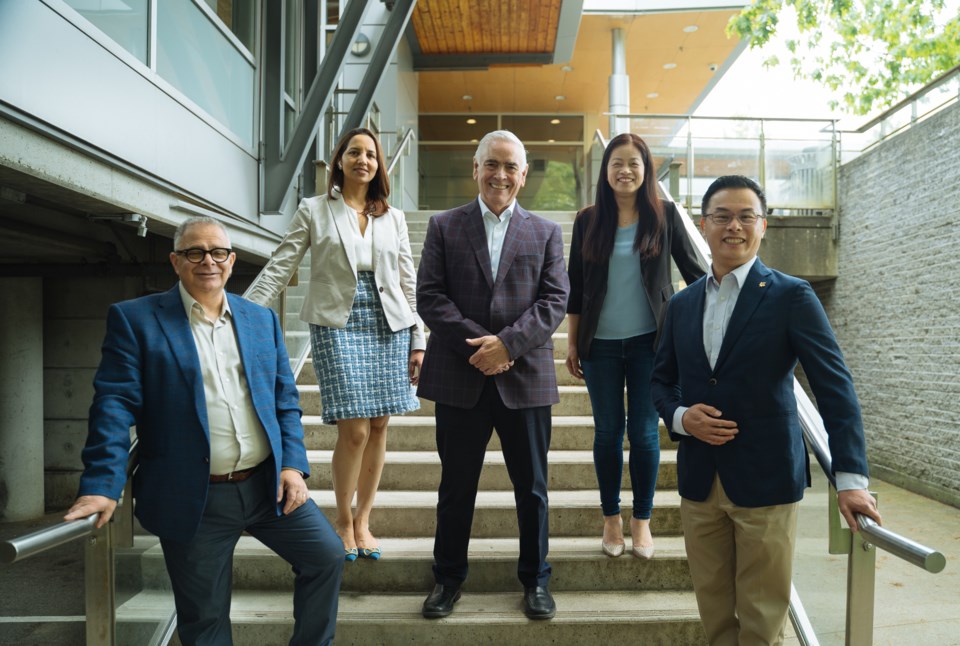Burnaby’s newest political party wants to freeze taxes and build, build, build — townhouses, not towers.
Incumbent councillor and founder of the party, Coun. Mike Hillman said one of his priorities is keeping families together — and to do it affordably.
‘Townhouses instead of towers’
For Hillman, this means increasing density — “gently,” he qualified — within 15-minutes of transit, and elsewhere in the city, where he wants to make it easier to build more housing units on a single lot (like laneways and allowing an extra storey of height), with pre-approved designs.
Kit Sauder, One Burnaby’s campaign manager, said Burnaby currently has about 38,000 existing single-family lots – some duplexes, some with the potential for laneway suites.
He said One Burnaby is proposing within the first 100 days to allow four housing units per residential lot (“four-plexing”), and six units per lot (“six-plexing”) within 15 minutes of rapid transit.
“We estimate that over the course of the next 50 years, we’d be able to introduce a minimum of 258,000 additional units, which means that we can double the population of the City of Burnaby, with no midrise … or highrise additional construction at all,” Sauder said, adding, “It’s townhouses instead of towers.”
“There’s no reason that it should be easier to buy a tear-down and build a mansion on top of it, than to build a multiplex,” said Sauder.
The party hopes to introduce flexible zoning to allow corner stores, coffee shops, child-care spaces “on every corner in your neighbourhood.”
One Burnaby: Freeze taxes?
It’s a classic campaign pledge: your taxes won’t go up!
One Burnaby says they want to freeze taxes in 2023 as a response to the cost-of-living crisis.
The party has committed to keep property tax increases at or below 2.95 per cent per year until the next election in 2026.
But individuals aren’t the only ones facing the effects of inflation: the city is in the same boat.
Hillman acknowledged the city faces increased costs.
He and Sauder point to Burnaby’s almost-$2 billion in reserves, saying it’s time for Burnaby use the money to help its citizens.
Hillman added Burnaby also has a lot of statutory funds (money which has its uses restricted by law): “Those things are all locked in as to what we can do with them. Do we actually ever sit down and say, ‘Are we getting the right value for those things and using those funds in areas that we need to?’”
According to the city’s most recent financial plan, “a majority of these reserves are set aside for specific purposes as defined by legislation or committed for future amenities to meet the needs of the city’s growing population.”
The high inflation of the past two years, along with price increases in construction services and supply chain disruptions and a “higher than anticipated” RCMP collective agreement, as well as increases to waterworks and sewer costs from Metro Vancouver, mean that Burnaby is already planning to dip into its reserves from 2023 to 2026.
The financial plan is working on an expected property tax rate increase of about 4 per cent per year from 2023 to 2026.
A Burnaby housing authority
All three Burnaby parties have promised to create a housing authority.
One Burnaby’s plan wants to see it as an arm’s-length non-profit corporation that would purchase public lands and build in partnership with local First Nations and the federal and provincial governments.
“The goal there is to basically treat public land as a public trust, with a medium goal of housing teachers, health-care workers and first responders close to the places where they work,” Sauder said.
“Then scaling out to do supported and affordable housing, and ultimately, potentially, market housing,” he said, like co-ops, rent-to-own, lease-to-own programs on 99 or 75-year long-term leases.
Hillman said it will allow police and fire and other service workers to be able to live within the community, rather than moving out to Abbotsford or Surrey.
“Yes, it’s subsidizing them to a certain extent, but it’s also adding to the value of service … you’re getting from the forces that are working for you. So, the housing authority can do some of that,” Hillman said.
He said the housing authority could also allow small-scale landlords, like owners of three-storey apartment buildings, to become shareholders in redevelopment projects with larger developers.
“You don’t need a bureaucracy to do that. What you need is a housing corporation that’s got the ability to get the work done.”
The One Burnaby team is running five new candidates in addition to Hillman: Mona Grewal, Richard T. Lee, Richard N. Liu, Mario Miceli and Brea Huang Sami.
Other One Burnaby campaign promises:
- Set council term limits
- Create a civic report card to track “how Burnaby City Hall is doing against key performance indicators”
- Monthly lottery for $500 e-bike vouchers from Burnaby-based bike shops
- Introduce a free parking decal program, making parking meters free for decal holders and charging those who don’t live in Burnaby
- Residents who give up one of their two household parking permits will be given a $500 voucher to purchase an e-bike from a Burnaby business
- Double the rate of tree planting
- Introduce a ‘Car 87’ program partnering Burnaby RCMP officers with Fraser Health nurses and social workers for non-criminal emergency calls, and community policing.
One Burnaby’s full campaign platform can be found online.





